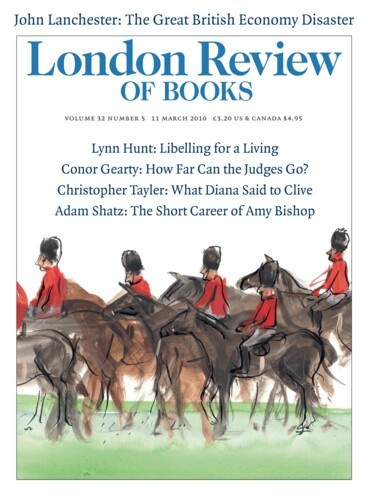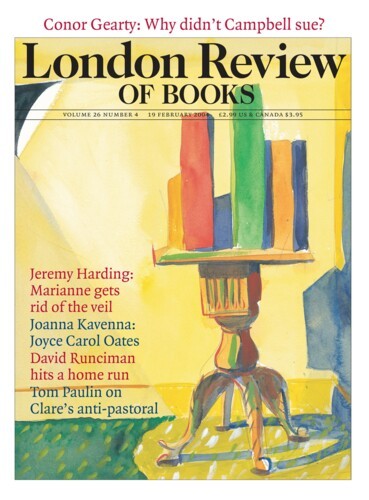The law presents some inconvenient obstacles to the coalition’s series of assaults on the poor. The government is meeting the threat in two ways. When it has no option, it removes legislation that requires it to act as though fairness were more than an advertising slogan. So Harriet Harman’s Equality Act is to be repealed. Much better from the coalition’s point of view, however, is to preserve the form of the law while making sure the poor have no chance to use it.
Conor Gearty
Conor Gearty is a professor of human rights law at the LSE and a barrister at Matrix chambers. Homeland Insecurity, about global anti-terrorism law, will appear in May.
Terms of Art: Human Rights Law
Conor Gearty, 11 March 2010
If the first legitimate worry about a social democratic bill of rights would be an explosion of litigation, the second concerns the danger of legitimating a wrong or a great injustice. The Human Rights Act has not really been tested in this regard, since Labour has done so little of an even vaguely socialist nature. But the right to property probably did constrain it in relation to the nationalisation of Network Rail (otherwise why pay compensation?) and there can be little doubt that private schools are standing by with batteries of lawyers to argue that even removing their charitable status (much less the schools themselves) will be a breach of the human rights of parents.
The rule of law has become a constitutional treasure in Britain because it has managed over the years to deliver an appearance of legality without threatening to destabilise the exercise of raw executive power. Judges have held ministers to account on matters of no great importance - but they always used to run for cover if the magic formula 'national security' was so much as whispered in their presence. Unions have been banned (at GCHQ), internment imposed (during the Second World War), political parties censored from the media (Thatcher's ban on Sinn Féin), CND protesters prosecuted under the official secrets act - and all with the enthusiastic endorsement of successive generations of judges who saw themselves (almost unashamedly) as the iron heel (as Jack London put it) with which brutally to stamp out dissent. The last of these regiments of yes-men were the generation (Lane, Donaldson, Bridge, Denning et al) who saw it as their duty to make sure that any Irishmen brought into their courts, on any count, stayed in the jails to which the police had consigned them - regardless of how obviously ill-treated they had been, or otherwise vulnerable.
Short Cuts: intercept evidence and terrorism trials
Conor Gearty, 17 March 2005
The government’s reluctance to allow intercept evidence to be used in court to procure the conviction of terrorist suspects seems mysterious and self-defeating: why deny yourself such a key weapon in the ‘war against terror’, especially if there are ‘several hundred’ terrorists already in this country planning attacks, as the prime minister has recently claimed?
...
A Misreading of the Law: Why didn’t Campbell sue?
Conor Gearty, 19 February 2004
“If Gilligan’s broadcast was so terrible, if the Blairs were having sleepless nights as a result of being accused of deceit, if the prime minister was shunned at home and abroad as a liar, the law has a simple remedy, the one adopted by Albert Reynolds in the case that Hutton makes so much of: sue for libel.”
Pieces about Conor Gearty in the LRB
How the Judges Stood in the Way of Socialism
Bernard Porter, 1 June 2000
This book’s most startling revelation – if true – concerns the state of legal education in Britain today. We are told that from their ‘first days at law school’ our...
Read anywhere with the London Review of Books app, available now from the App Store for Apple devices, Google Play for Android devices and Amazon for your Kindle Fire.
Sign up to our newsletter
For highlights from the latest issue, our archive and the blog, as well as news, events and exclusive promotions.




